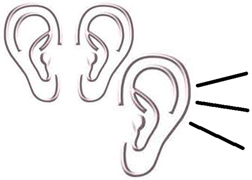Two Ears
continued from Page 1
lost your wallet? That’s nothing. My wife left her purse in the State Park Women’s Room with $500 in it and we never got any of it back.”
Another kind of reaction to a friend’s bad news is on a different level. Many of us immediately jump into the fixing role. If you share with me that you broke your finger, I instantaneously bring forth ways of repairing it, or speeding up recovery: “Broke your finger? Here is what you should do and it will be as good as new in ten days….”
Some of us remember something similar and that is what we talk about. It may be interesting and even helpful, but because of bad timing, it is likely to be an inappropriate way of showing concern and compassion for a hurting or upset person. It can show little or no evidence of being personally touched or sympathetic.
The life of one working hard to express care and kindness must take on a different assignment. Distressed people need a touch of Love, which is also a touch of God. This is where the third ear comes in.
“Lost your wallet? What a bummer!” As plain and casual as it sounds, “bummer” is a word that says, “I understand you are in dismay.” It is loving–kindness in capsule form. It is a spiritually relevant word.
 “Broke you finger? Ow. That can hurt a lot.” Again, the heart is speaking. “Ow” connects with their pain. It is an expression of love trickling into the hurting person. As ordinary as that may sound, it is the loving Lord Jesus, living in one’s heart, who has reached out to the injured party and tuned in to their pain. It is compassion.
“Broke you finger? Ow. That can hurt a lot.” Again, the heart is speaking. “Ow” connects with their pain. It is an expression of love trickling into the hurting person. As ordinary as that may sound, it is the loving Lord Jesus, living in one’s heart, who has reached out to the injured party and tuned in to their pain. It is compassion.
The third ear hears more than the simple facts that were picked up by the two ears. The third ear hears the emotions, the concern, the grief, the pain that underlies the facts. Our work, as people who show care and demonstrate kindness, is to express compassion—to show the love of God. God is compassionate. God feels with us. That is what the word compassion means: “to feel with”. And spiritual maturity is the process of letting the Love of God flow out of our hearts into others, rather than limiting our attention to the ‘facts of the case’.
 The third ear hears the feelings of the one who is hurting. The other two ears hear his words, his explanation, his story. While our ordinary two ears are working at their specialty—facts and information—our third ear tunes into distress, heartache, confusion, fear, frustration, anger, sadness.
The third ear hears the feelings of the one who is hurting. The other two ears hear his words, his explanation, his story. While our ordinary two ears are working at their specialty—facts and information—our third ear tunes into distress, heartache, confusion, fear, frustration, anger, sadness.
This special ear tunes in to our own heart and our own hurts. We put ourselves in the other’s place and either recall or imagine what they are feeling. Then that realization is put into words as a caring gift to the one we are listening to: “Oh, that is so sad!” or “Oh, that must have been very frightening.”
Listening with our third ear is not easy. It takes effort and concentration to zero in on what the other is most likely feeling. Responding from that source often means biting our own lip to keep from saying what immediately comes to mind. It may require changing a way of life that has always tried to fix or has started to talk about the first thing that came to mind. A new habit may need to be developed.
Keep the focus on them
If, when we jump into another person’s ordeal, we reach back into our memory, or we move into how to repair the situation, something backward happens. Immediately, the one in distress is listening to us. The injured one, who should be talking, is now politely paying attention to what WE have gone through, or what we advise THEY should do. Feelings have been left behind.
 Death in the family, marital breakdowns, job loss, and other unwanted blows may need hours of talk. Some folks pay a therapist for the chance to tell their story. That is how vital it really is to talk. But good friends, being loving instruments of a loving God, can be enormously helpful, too. And it starts with an open heart that realizes and names the heartache, listens to the lament and the circumstances, “weeps with those who weep”, accepts anger and anguish in any form.
Death in the family, marital breakdowns, job loss, and other unwanted blows may need hours of talk. Some folks pay a therapist for the chance to tell their story. That is how vital it really is to talk. But good friends, being loving instruments of a loving God, can be enormously helpful, too. And it starts with an open heart that realizes and names the heartache, listens to the lament and the circumstances, “weeps with those who weep”, accepts anger and anguish in any form.
nd always, fight down the urge to tell your own story or hand out remedial suggestions. Doing that is being a loving Jesus to another.
Caring for those who are hurt is a spiritual exercise. Prayer and reflection may help a lot as we endeavor to let God’s loving spirit, the love of Jesus, flow through us instead of just saying whatever comes to mind. Spiritual sensitivity is a lot more about being present and listening than it is about talking. The third ear is spiritual sensitivity.
Listening
So let’s talk about listening. Here is a handful of special rules every caring listener must follow in order to be effective:
1. The wounded and grieving need to talk. Most of the time those who have been hit by something devastating or frightening are feeling a strong urge to put into words what they have gone through and what is percolating in their hearts.
2. The loving listener will hear their account, listen to their feelings, and accept their tears.
3. The caring friend is not there to cheer or fix them. Helpfulness does not depend on finding words that brighten the scene or distract them, or make them smile.
4. One’s helpfulness is mostly in being present. Showing up is 90% of helping. It is powerfully spirit-lifting when
aring people show up after a painful loss or injury. You are God’s presence. Your presence is strong love medicine, just by itself.
5. A loving prayer is talking to God in clear and specific words about their hurts and heartaches. It names the painful issue and asks God to bring them comfort. God already knows about it, but the caring person still puts it in words.
6. Healing will happen. God takes care of that. We are instruments of compassion.
One Mouth
Continuing our attention to this strange-looking face, you will notice that having three ears leaves less room for a mouth. To be a good listener, you have less need for a mouth. Talking is not nearly as important as listening. When we follow the urge to talk, we bring up our own stories; we try to comfort with the usual pat phrases; we try to fix the problem and offer advice.
Leave the mouth silent. Your presence with the other person, and your willingness to listen as they need to talk, is healing to them. And now, as you listen with your third ear; as you listen to their emotions and feelings, you can bring in another important part of your anatomy — your brain.
 When your brain is engaged as you listen, the person’s words don’t go in one ear and out the other. You store away pieces of their story that tell what is most important to them as they go through this. You listen for what they are NOT saying; the things left unsaid are often quite relevant. You pay attention to the whole person—not just the words they are saying.
When your brain is engaged as you listen, the person’s words don’t go in one ear and out the other. You store away pieces of their story that tell what is most important to them as they go through this. You listen for what they are NOT saying; the things left unsaid are often quite relevant. You pay attention to the whole person—not just the words they are saying.
Sometimes there are times of prolonged silence and the listener may feel the need to help the hurting person talk a little more. So a question is asked. But questions are not advisable when someone is hurting. Questions move people into their brains. They have to think. There is nothing wrong with thinking, but hurting people need the opportunity to spill out their feelings.
They need to let their distress, heartaches, worries, and anger flow from their hearts and spill from their lower regions. Questions move them to their heads. They have to think. The flow of emotion is stymied by questions.
What to say, or not to say
Instead of questions, another kind of remark is recommended. If one is sitting with a grieving husband whose wife has died, a sentence like this might stimulate the catharsis such a heartbroken man needs: “It doesn’t seem possible.” Or “she was such a wonderful person.” Another tack would be to share a memory: “She always asked me about my mother.”
Such statements stay with feelings. They naturally fit the emotions of the hurting man and probably he will respond on the feeling level rather than ponder or reflect in his head about what was asked.
Going back to the lost wallet vignette, one might say something like, “Everything stops when you lose a wallet.” And for the broken finger say, “That can mess a lot of things up for awhile.”
So listening is also about responding. The third ear hears the hurt, the excitement, the fear. And the caring person encourages talking from the heart, sharing, even weeping, to facilitate the healing process and to communicate loving kindness.